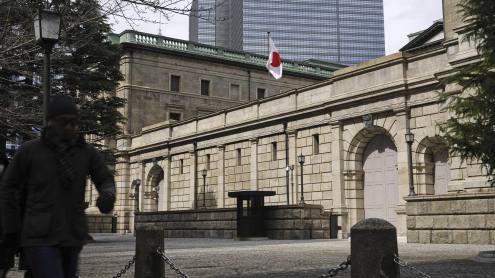
Commercial banks in the US and the UK have expressed concerns that the imposition of negative interest rates could crush their earnings and diminish their ability to absorb an expected avalanche of bad loans as a result of the coronavirus crisis.
Bank of England governor Andrew Bailey recently said that the UK central bank’s main interest rate, currently at just 0.1%, is under “active review”, opening the prospect for negative rates.
In the US, the Federal Reserve has discussed imposing negative interest rates as the economy grapples with its worst crisis since the Great Depression.
At the Fed’s Federal Open Market Committee on April 28-29, the central bank’s chairman Jerome Powell openly discussed the use of negative interest rates, though the 17 committee participants unanimously opposed the measure for the time being. This view has been reiterated throughout May in media interviews and in testimony to the Senate.
Mr Powell said the main reason for the opposition is “concern over interrupting the intermediation process and reducing bank profitability, thereby reducing the availability of credit in the economy”, particularly if banks cannot pass on negative rates to depositors.
In that regard the experience of the eurozone is a reminder of the damage negative interest rates can inflict on banks.
Goldman Sachs analysts argue the same would happen in the US as a result of such a policy.
The investment bank recently cited academic research suggesting that the impact of negative rates on banks has on average been neutral, and that financially sound banks did pass on negative rates to corporate depositors.
Long-term profitability risks
In the UK, Bank of America analyst Rohith Chandra-Rajan reckoned that a -0.25% interest rate would push the banking sector’s return on equity into low to mid-single digits and wipe out 50% to 70% of the profits of UK banking businesses. He warned that negative interest rates would have a much longer-lasting impact on UK bank profitability than the current credit quality issues.
Meanwhile, UK banks are already provisioning for nearly £20bn worth of bad loans for 2020.
Banks would likely respond to such a measure by charging higher fees to clients and even pass on negative rates to corporates and other large depositors.
The experience of negative interest rates for banks in the eurozone has not been positive and has tended to weaken struggling ones even further.
Bank lobby group UK Finance has said there is as yet no certainty that negative interest rates stimulate demand. In Germany negative euro interest rates actually saw savings rise possibly because savers thought it was a sign of terrible economic conditions ahead.
Andrew Sentance, a former Bank of England monetary policy committee member said he doubts his former employer will pursue negative interest rates and believes they will do more harm than good. He also does not think monetary policy can address the supply-side shock caused by population shutdowns.
However, a poll conducted by news agency Reuters in May found that most respondents do not believe the Bank of England will pursue negative interest rates and would be more likely to do extra quantitative easing instead.
“While others may do so, ultimately we don’t think the US and UK will cut rates into negative territory – but with a slew of mixed messages coming from the Bank of England, our confidence in that view is decreasing. If negative rates are still seen as a red line, it appears to be a thin one that may get thinner,” said Colin Drybrough, multi-asset investment manager at Kames Capital.
Nonetheless, yields on gilts, UK government bonds, have recently been in negative territory.
This is an edited version of articles that first appeared in The Banker's sister publication Global Risk Regulator.






